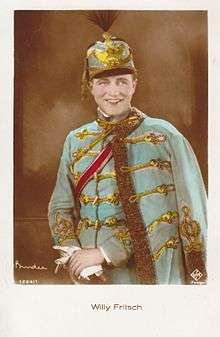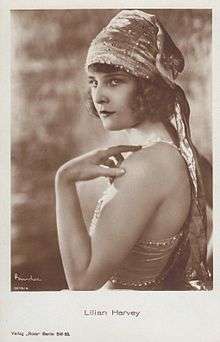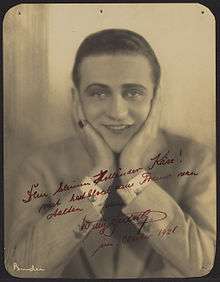Willy Fritsch
| Willy Fritsch | |
|---|---|
 Photography by Alexander Binder, about 1927 | |
| Born |
Wilhelm Egon Fritz Fritsch 27 January 1901 Kattowitz, German Empire |
| Died |
13 July 1973 (aged 72) Hamburg, West Germany |
| Occupation | Actor |
| Years active | 1921–1964 |
| Spouse(s) | Dinah Grace (d. 1963) |



Willy Fritsch (27 January 1901 – 13 July 1973) was a German theater and film actor, a popular leading man and character actor from the silent-film era to the early 1960s.
Biography
He was born Wilhelm Egon Fritz Fritsch, the son of a factory owner in Kattowitz (present-day Katowice) in the Prussian province of Silesia. After the bankruptcy of his father in 1912, the family moved to Berlin, where Fritsch sr. worked as an employee of the Siemens-Schuckert company. Young Willy originally planned an apprenticeship as a mechanic, but soon resorted to the occupation as an extra at the Großes Schauspielhaus theatre.
From 1919 he attended Max Reinhardt's drama school at the Deutsches Theater, where he debuted with small roles, and made his feature debut in films as a supporting player in 1921's Miß Venus. In 1925, Fritsch gained international attention by playing the leading character in A Waltz Dream directed by Ludwig Berger. Afterwards he was offered a United Artists contract but refused to move to the United States due to his lack of English language knowledge. At the end of the 1920s, Fritsch was also starring at two action films directed by Fritz Lang, Spies and Woman in the Moon where he played serious characters. However, his break through came as a juvenile lover after being paired with either Käthe von Nagy (i.e. in Billy Wilder's script debut Her Grace Commands, 1931) or Lilian Harvey, when they appeared regularly together in UFA movies like The Three from the Filling Station (1930) or Congress Dances by Erik Charell (1931), released almost every year thereafter until Harvey's emigration in 1939. He mainly starred in the German versions and was often replaced by Henri Garat until his movies were dubbed during the mid-1930s. Fritsch was married to artistic dancer Dinah Grace in 1937 and became a father of two sons. The younger one, Thomas Fritsch, is a successful actor as well.
Though he had joined the NSDAP, Fritsch tried to avoid getting involved in Nazi propaganda (except for his appearance in the 1944 aviator movie Junge Adler, which earned him an entry on Goebbels' Gottbegnadeten list) and managed to survive the Hitler era without any loss of prestige. He continued to appear in movies like Film Without A Name together with Hildegard Knef or Wenn der weiße Flieder wieder blüht (When the White Lilacs Bloom Again) side by side with young Romy Schneider. In 1958, Fritsch starred in the German version of Mit Eva fing die Sünde an, which was later adapted and filled with additional scenes by Francis Ford Coppola for his debut release of The Bellboy And The Playgirls (1962). Fritsch's final film was 1964's I Learned It from Father (Das hab' ich von Papa gelernt) directed by Axel von Ambesser, in which he performed together with his son Thomas.
Fritsch died of a heart attack aged 72 and was buried at Ohlsdorf Cemetery in Hamburg.
Filmography
As actor
|
|
In Popular media
In Quentin Tarantino's 2009 film Inglourious Basterds, Lilian Harvey's duet with Willy Fritsch from the 1936 film "Glückskinder", Ich wollt' ich wär ein Huhn ("I wish I was a chicken") can be heard playing on a phonograph in the basement scene "La Louisiane" as well as in the extended scene "Lunch With Goebbels", as Joseph Goebbels (Sylvester Groth) happily sings a portion of the song after deciding to hold a private screening of the film. After the screening, cinema owner, Shosanna Dreyfus (Mélanie Laurent), under the alias "Emmanuelle Mimieux", comments on liking Lilian Harvey in the film—to which an irritated Goebbels angrily insists her name never be mentioned again in his presence. The song as performed by the Comedian Harmonists remains popular in Germany to date.
| Wikimedia Commons has media related to Willy Fritsch. |